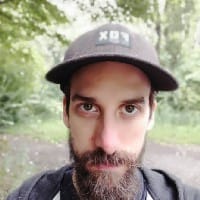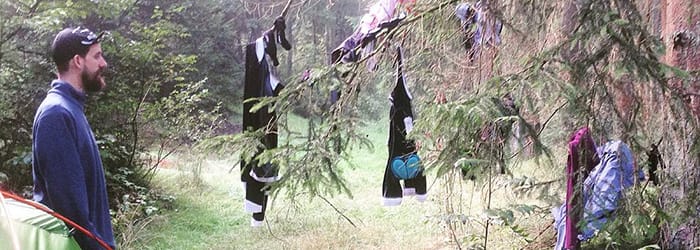
Learnings from a month bikepacking
Before we jump into the details, lets backtrack a little bit, our first bike ride together was in Spring 2017, Mimouna jumped on her holland bike, I took my cyclocross bike, we ended up cycling about 60km. For her it was an effort, for me it was “just rolling” next to her.
Shortly after, she acquired a gravel bike. This is the beginning of a few daily trips around Berlin, summer week-ends with bikes, friends & sleeping bags, and the ultimate, perhaps rhetorical, question: “Lets ride our bikes, for a month, with a tent?”.
Lets ride our bikes, for a month, with a tent? — YES!
So we prepared, planned, acquired missing equipment, crafted our own IKEA wood stove, and bought train tickets.
We drew routes through the Belgian Wallonia, taking us from the beautiful wooden Ardennes and the highest point of Belgium, to the wildlife parks, country fields, and valleys of Namur.
In addition we planned another route in France, through the vineyards of Nouvelle-Aquitaine from Bordeaux to Saint-Émilion, and then to Toulouse along the Canal du Midi, to Occitanie, taking us to the magnificent Pyrénées.
Weather
So came September… and as we rolled out for our first day in the Ardennes, the weather shifted and replaced the green landscapes, with frosty fog and intense rain, we got very wet and decided to setup our tent next to a cycling road in the woods.

We learned a lot from the first day, particularly how to predict rain, and decided on a few strategies: look up at the sky, check weather forecasts regularly and ride in times the chance for rain is the lowest, when/if the rain intensifies and is not seemingly stopping within 30 minutes, we setup camp, wherever we are. This strategy kept us dry and cozy for most of our trip.
When we got wet, we quickly realised that there was no way around putting on wet shoes, they’ll dry eventually, and quicker than we thought.
Food
The first week was crucial for nutrition, we started to buy food en masse, which was a mistake, after our first stop at a grocery store we ended up carrying food for a full week, it really wasn’t necessary in a densely populated country like Belgium. So we scaled down our food purchases as we kept on riding, we learned to tell our brains that we won’t be running out of food, and we taught ourselves to prepare delicious meals with simple and common ingredients, it was a very creative and fun process.
We eventually carried no more food than 2 days worth of meals. This meant we stopped for groceries every second day, which is great because it allowed us to cary fresh products such as bread and cheese.
Equipment failures
With every equipment there is a risk of failure, and particularly when trying out new equipment, or postponing maintenance of old equipment.
I experienced multiple issues with my paniers, screws got loose from the fabric, my rack unscrewed itself due to vibrations, etc. We ran out of chain oil, we got flats at unfortunate moments, my hand-pump broke,…
A few key lessons here are:
- Store your hand pump in your luggage, a frame holder will accumulate a lot of grid and/or water in extreme weather conditions, rendering the pump useless.
- Use loctite on all crucial screws, and store a few screws for paniers and other components, they don’t weigh much and they might get you out of situations in which you are stranded in the middle of nowhere at the side of the road, or a trail in the woods.
- Zip ties are life savers, with them I attached my rack back to the frame until I got to a bike shop, and how I prevented the paniers from falling, pack a lot of them, they can be even helpful to fix a flat.
- Things break, and if you can’t fix them yourself, a lot of friendly helpful people will be happy to help you out on the road.
Wild-camping
At first, wild-camping made us feel like criminals, it is mostly illegal on private land in central Europe, and rarely allowed on public land. But with time, we cared less and less about the Law, and more about our comfort, we ended up camping at beautiful spots next to rivers, in the mountains and on green fields, the fear of being discovered almost completely vanished.
When the land was very close to a house and the owner seemed to be around we ended up asking, not a single person refused our presence.
Some public camp spots are equipped with sanitaries and completely free, they are hard to find though, and we had to ask locals and café owners about these places.
Tell us, what have you learned on longer bikepacking trips?